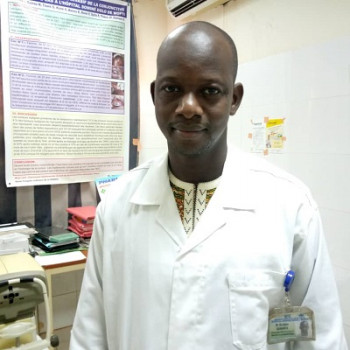Dr. Bamanta is head of the Ophthalmology Department at the Hospital Sominé Dolo in Mopti, a reference centre for the region. Currently, thanks to support from the Foundation, he is carrying out a semi presence-based training programme at the Hospital Cheikh Anta Diop in Dakar, Senegal, so as to improve his skills with respect to paediatric care. He only has to complete the final evaluation to obtain a University Diploma in Paediatric Ophthalmology. Studies in which the Ocularis Association and the Sant Joan de Déu Hospital in Barcelona have collaborated. When he has completed his studies, Dr. Bamanta would like to establish a team able to treat children’s eye diseases in the centre and north of Mali.
Why did you decide to study medicine and what made you specialise in ophthalmology?
I studied medicine because of my passion to treat people. In the fifth year of the degree, I was fascinated by my professor of ophthalmology who invited me to write my thesis in the corresponding department. After completing my degree, I worked in obstetrics as a resident for two years whilst maintaining my passion for treating eyes. Ophthalmic training at the IOTA Hospital and University Centre was a great opportunity which I did not want to pass by.
What does your daily routine consist of at the Sominé Dolo Hospital? What are the most frequent pathologies? What kind of patients come for appointments?
I have quite a busy schedule, especially because I am the only ophthalmologic surgeon in the department. Mondays and Wednesdays are devoted to routine consultations with programmed surgical interventions. I operate on Tuesdays and Thursdays from 6 to 12 in the morning, and the afternoons are assigned to refractive cases, particularly children. On Fridays I carry out laser surgery, administrative issues, and attend mainly children who come to the usual consultations.
We treat almost all ophthalmologic pathologies because we are a reference for the centre and northern parts of the country. The illnesses include cataracts, glaucoma, retinopathies, children’s ocular pathologies, accidents…
I see patients of all ages and with all kinds of conditions. I have an excellent collaborative relationship with other specialists who refer patients when necessary.
Why did you decide to specialise in ophthalmology? What kind of ocular care do the children who come to your consultation principally need?
When I did the specialised studies diploma in ophthalmology with Dr. Sylla I was attracted to paediatric ophthalmology. On arriving at Mopti, I became aware of how difficult it was for children and their parents to access the only specialist available at the IOTA Hospital and University Centre. The geographical location of Mopti allows me to cover this region and all the northern part of Mali given the lack of paediatric ophthalmologists.
The children attend the consultations for various motives. The most common concern the eyelid, the conjunctiva and the lacrimal system, refractive disorders, and congenital pathologies. There are also urgent ophthalmologic cases usually related to accidents.
Do you remember any particular case of a child with a pathology that had a special impact on you?
Yes, of course, a little girl suffering from convergent strabismus in both eyes. We were able to correct it with the help of my optometrist assistant.
How do think the training that you have almost finished in Senegal will improve ocular care for children in the Mopti region?
The training will clearly improve the treatment of children’s eyes thanks to my availability and proximity. What will improve most is the technical platform in terms of paediatric ophthalmology.
It will have a real impact because families will be able to access a specialist to treat their children’s eyes without having to wait for an appointment or be obliged to go to Bamako.
How do you evaluate the support you have received from the Eyes of the world Foundation with respect to your training?
Very good because thanks to this I have been able to receive the training I wanted, and in very good conditions.
What other kinds of training courses do you think are needed to improve ocular care in the Mopti population?
A university diploma in eyelid and conjunctiva pathology, and training in glaucoma and orthoptics.
What is needed to eradicate avoidable blindness in Mopti? How do you think the Foundation can contribute to achieving this?
Eradicating avoidable blindness implies many actors such as currently the Foundation, us (the technicians), and the community itself. The Foundation can intervene by encouraging activities for the population as a whole, either through grants or free of charge, and reinforcing the capacity, in terms of both human and material resources, of our services.
